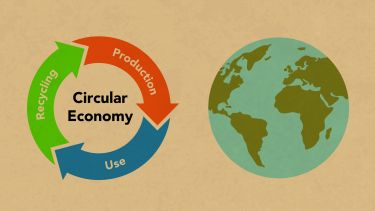Energy Institute members from the Faculty of Engineering will take part in a new government-funded project to create and support a circular economy in five key industries. The new interdisciplinary research centres will help manufacturers to use fewer resources, reduce waste and deliver huge environmental benefits.
Experts from the construction, textiles, chemical and metals industries will come together in five research centres to uncover ways to reduce the significant amount of waste produced by processes in each of these areas. Emissions from the UKâs textiles industry alone are almost as high as those from cars used for private trips, and 154 million tonnes of mineral waste is created each year, enough to fill 30,000-Olympic-sized swimming pools. Moving towards a circular economy will lower the impact of production and consumption of products from these areas - which include clothing, concrete, detergents and metals such as lithium - and encourage reuse instead of disposal.
Two members from the Energy Institute will be involved in the project. Professor Peter Styring from the Department of Chemical and Biological Engineering will work with the team at Loughborough University on the Interdisciplinary Centre for Circular Chemical Economy, which will feature experts from five other universities and more than 20 industrial partners from around the world. Their aim is to create and implement methods to produce olefins without the use of fossil carbon, chemicals that are fundamental feedstocks in the chemicals industries and also used to make plastics and synthetic fibres.
Professor John Provis from the Department of Materials Science and Engineering will work with the team at University College London on the Interdisciplinary Circular Economy Centre for Mineral-based Construction Materials. This centre will explore how to better design and manufacture products and structures made from materials such as cement and brick. The construction industry will benefit from advice on how to reduce waste, pollution and the costs of their current and future processes.
As well as direct work in their areas of expertise, the University of 91ÖḟĠċ team will contribute a major role in advising the government on policy development and public engagement.
Speaking about the announcement, Professor John Provis said: âThis new interdisciplinary research centre will open enormous opportunities to reduce the carbon emissions and material consumption footprints of the UKâs construction sector, as we develop world-leading ways to manage and use our mineral-based resources for the benefit of society.â
Professor Peter Styring said: âAt a time of unprecedented change, this is an ideal opportunity for us to help develop new and sustainable manufacturing strategies for the chemicals industry. For too long now we have been relying on a linear approach to manufacturing chemicals in a disposable society.
âThe team is highly impressive in both its breadth and depth, but the main strength is in its innovative vision. The large number of key industries that have signed up to be a part of the centre is testimony to the national and indeed global importance of the vision both environmentally and economically.
âWe have four years to make an initial impact. However, we are aware that the transition will take significantly longer so we are already putting measures in place to ensure its longevity which will ultimately be the key to major success.
âThe centre is due to begin on 1 January 2021, but the enthusiasm is such that we are already planning the transition towards its start.â

